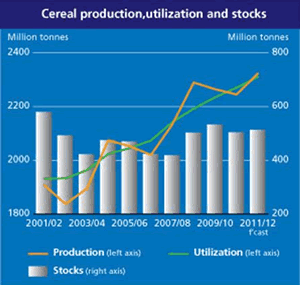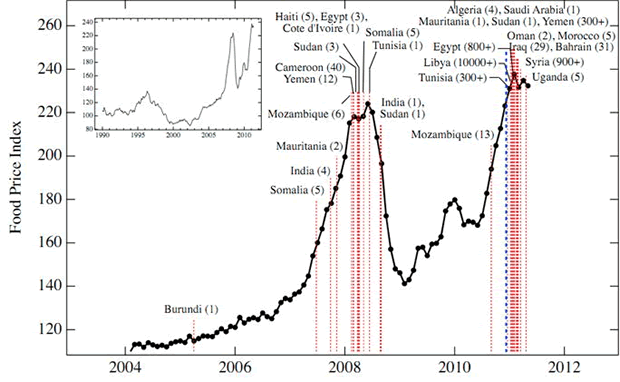Food Provisions Shortage Sparked Arab Spring
Politics / Food Crisis Jan 14, 2012 - 06:15 AM GMTBy: Richard_Mills
 In 1798 32 year-old British economist Malthus anonymously published "An Essay on the Principle of Population" and in it he argued that human population's increase geometrically (1, 2, 4, 16 etc.) while their food supply can only increase arithmetically (1, 2, 3, 4 etc.).
In 1798 32 year-old British economist Malthus anonymously published "An Essay on the Principle of Population" and in it he argued that human population's increase geometrically (1, 2, 4, 16 etc.) while their food supply can only increase arithmetically (1, 2, 3, 4 etc.).
"The power of population is indefinitely greater than the power in the earth to produce subsistence for man". Thomas Robert Malthus
It is estimated that the population of the world reached:
- One billion in 1804
- Two billion in 1927
- Three billion in 1960
- Four billion in 1974
- Five billion in 1987
- Six billion in 1999
The second half of the 20th century saw the biggest increase in the world's population in human history. Our population surged because:
- Medical advances lessened the mortality rate in many countries
- Massive increases in agricultural productivity because of the "Green Revolution"
The global death rate has dropped almost continuously since the start of the industrial revolution - personal hygiene, improved methods of sanitation and the development of antibiotics have all played a major role.
The world's population was said to have reached 7 billion on October 31, 2011 and is estimated to hit the eight billion mark by 2030.
By 2050, the world's population is expected to reach around nine billion - minimum and maximum projections range from 7.4 billion to 10.6 billion.
By the mid 2060s it's possible that 11.4 billion people will inhabit this planet.

Malthusian pessimism has long been criticized by doubters believing technological advancements in:
- Agriculture
- Energy
- Water use
- Manufacturing
- Disease control
- Fertilizers
- Information management
- Transportation
would keep crop production ahead of the population growth curve.
Malthus's prediction hasn't come true because, so far, rising agricultural yields have always outpaced population growth.
Enter the Black Swans
The Black Swan Theory or "Theory of Black Swan Events" was developed by Nassim Nicholas Taleb to explain: 1) the disproportionate role of high-impact, hard to predict, and rare events that are beyond the realm of normal expectations in history, science, finance and technology, 2) the non-computability of the probability of the consequential rare events using scientific methods (owing to their very nature of small probabilities) and 3) the psychological biases that make people individually and collectively blind to uncertainty and unaware of the massive role of the rare event in historical affairs. Black Swan Theory refers to unexpected events of large magnitude and consequence and their dominant role in history. Such events, considered extreme outliers, collectively play vastly larger roles than regular occurrences. Wikipedia
Threats to access and distribution of food supplies could include:
- Political instability of supplier countries
- The manipulation of supplies
- The competition over supplies
- Attacks on supply infrastructure
- Accidents and natural disasters
- Climate change
The term Green Revolution refers to a series of research, development, and technology transfers that happened between the 1940s and the late 1970s.
The initiatives involved:
- Development of high yielding varieties of cereal grains
- Expansion of irrigation infrastructure
- Modernization of management techniques
- Mechanization
- Distribution of hybridized seeds, synthetic fertilizers, and pesticides to farmers
All these new technologies increased global agriculture production with the full effects starting to be felt in the 1960s. The Green Revolution's use of hybrid seeds, irrigation, chemical fertilizers, pesticides, fossil fuels, farm machinery, and high-tech growing and processing systems combined to greatly increase agriculture yields. The Green Revolution is responsible for feeding billions - and likely enabling the birth of billions more people.
Cereal production more than doubled in developing nations - yields of rice, maize, and wheat increased steadily. Between 1950 and 1984 world grain production increased by over 250% - and the world added a couple more billion people to the dinner table.
Unfortunately the high yield growth is tapering off and in some cases declining. This is in large part because of an increase in the price of fertilizers, other chemicals and fossil fuels, but also because the overuse of chemicals has exhausted the soil and irrigation has depleted water aquifers.
"World agricultural markets have become so finely balanced between supply and demand that local disruptions can have a major impact on the global prices of the affected commodities and then reverberate throughout the entire food chain." ~ HSBC report
Over the next fifty years, as we add another 4.5 billion people to the world's population, global demand for food will increase almost 70% if population growth predictions are correct.
Already approximately one billion people go to bed hungry each night.
Somewhere in the world someone starves to death every 3.6 seconds - most are children under the age of five.
"The power of population is so superior to the power of the earth to produce subsistence for man, that premature death must in some shape or other visit the human race." ~ Malthus T.R. 1798. An essay on the principle of population.
There has been almost no real increase in funding of the international agricultural science effort since the 1970s. This global decline in agricultural R&D means less new technology will be available to farmers. What is available are Genetically Modified Organisms (GMOs) - heavily bio-engineered seeds - which rely on the same industrial credits - fertilizers, pesticides, diesel and irrigation - that the first Green Revolution did.
Conclusion
"Social unrest may reflect a variety of factors such as poverty, unemployment, and social injustice. Despite the many possible contributing factors, the timing of violent protests in North Africa and the Middle East in 2011 as well as earlier riots in 2008 coincides with large peaks in global food prices." ~ M. Lagi, K.Z. Bertrand and Y. Bar-Yam, "The Food Crises and Political Instability in North Africa and the Middle East" New England Complex Systems Institute

New England Complex Systems Institute
Population growth and increasing demand for food supplies go hand in hand. Unfortunately yield increases have generally leveled off and supply is barely keeping up with demand. The fact is, that today, we're one poor harvest, one Black Swan event away from a food supply catastrophe and a repeat of the food shortages that caused the Arab Spring. These facts should be on everyone's radar screen. Are they on yours?
If not, maybe it should be.
By Richard (Rick) Mills
If you're interested in learning more about specific lithium juniors and the junior resource market in general please come and visit us at www.aheadoftheherd.com. Membership is free, no credit card or personal information is asked for.
Copyright © 2012 Richard (Rick) Mills - All Rights Reserved
Legal Notice / Disclaimer: This document is not and should not be construed as an offer to sell or the solicitation of an offer to purchase or subscribe for any investment. Richard Mills has based this document on information obtained from sources he believes to be reliable but which has not been independently verified; Richard Mills makes no guarantee, representation or warranty and accepts no responsibility or liability as to its accuracy or completeness. Expressions of opinion are those of Richard Mills only and are subject to change without notice. Richard Mills assumes no warranty, liability or guarantee for the current relevance, correctness or completeness of any information provided within this Report and will not be held liable for the consequence of reliance upon any opinion or statement contained herein or any omission. Furthermore, I, Richard Mills, assume no liability for any direct or indirect loss or damage or, in particular, for lost profit, which you may incur as a result of the use and existence of the information provided within this Report.
© 2005-2022 http://www.MarketOracle.co.uk - The Market Oracle is a FREE Daily Financial Markets Analysis & Forecasting online publication.



